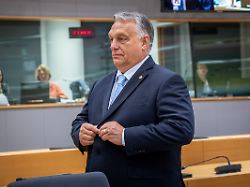Threatening scandal at the EU summit
Poland and Hungary are opposed to a compromise on asylum
06/30/2023, 04:30 am
Hadn’t the EU just agreed on an asylum compromise? Poland and Hungary were against it from the start and are now putting pressure on at the EU summit. But they won’t be able to stop the law.
The EU states are again arguing about the future asylum policy. At the EU summit, Poland and Hungary are calling for a move away from the difficult compromise that the interior ministers reached just under three weeks ago. But Germany and other countries held back on the first day of the summit. Around half past one in the night, the 27 heads of state and government parted for the time being without the planned joint declaration on the subject of migration. Talks are expected to continue in a few hours. The second day of the summit was actually supposed to be about the EU’s China policy.
In the asylum dispute, the interior ministers made a majority decision at the beginning of June that Poland and Hungary did not support. This stipulates that the acceptance of refugees should no longer be voluntary in the future, but mandatory. Countries that do not want to take in refugees would be forced to pay compensation. Poland is now demanding that each EU country should decide for itself how to support countries with particularly high migration numbers. The acceptance of people seeking protection should be voluntary, according to a Polish text proposal for the summit declaration.
The Polish government also took the position that migration policy should be decided according to the consensus principle, i.e. not by majority decision. Hungary also announced before the summit that it would not participate in the planned distribution of refugees in the EU and would not make any compensation payments. At the beginning of the summit, Chancellor Olaf Scholz appeared unimpressed by the Polish and Hungarian criticism. The solidarity mechanism agreed by the interior ministers is a major breakthrough, said the SPD politician.
If the 27 heads of state and government do not agree, it would be a scandal. In practice, however, the legislative process could continue. The next step is negotiations between the EU states and the European Parliament.
Reluctance to provide security guarantees to Ukraine
On the first day of the summit, the heads of state and government agreed on supporting Ukraine. They want to give Ukraine more support in planning an international peace summit, which could be organized in Switzerland according to Ukrainian President Volodymyr Zelenskyy. And the EU is offering further assistance to Ukraine after the destruction of the Kakhovka dam, on top of the civil protection assistance already provided.
However, the EU is reluctant to provide security guarantees for the period after the end of the Russian war of aggression. In the summit declaration, the heads of state and government only agreed on a vague declaration of intent for “future security commitments”. The reason for the cautious choice of words was the attitude of countries such as Austria, Ireland and Malta. They want to remain militarily neutral and are therefore not a member of NATO.
